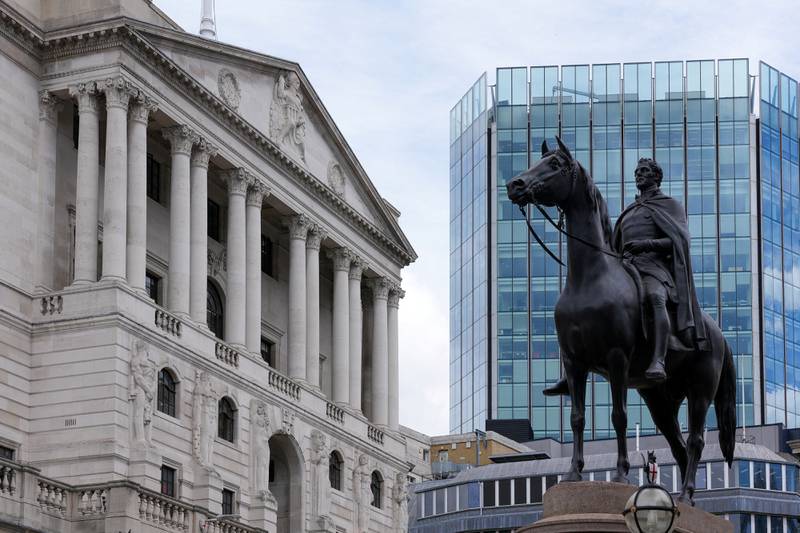Bank of England 'will probably need to raise interest rates' from current 14-year high

Collected Image
The Bank of England will probably have to raise interest rates further from their current 14-year high to tackle inflation pressures that are gaining a foothold in Britain's economy, Deputy Governor Dave Ramsden has said.
Inflation's spread is now showing up in rising British pay and companies' pricing plans, having originally been triggered by the reopening of the world economy from Covid-19 lockdowns and then by Russia's invasion of Ukraine, Mr Ramsden said.
But there is also a risk of an inflation mentality developing, Mr Ramsden said. “For me, personally, I do think it is more likely than not that we will have to raise bank rate further. But I haven't reached a firm decision on that,” Mr Ramsden said. “I am going to look at the indicators, look at the evidence as we approach each upcoming meeting.”
The BoE last week raised borrowing costs by the most since 1995 as it took the benchmark rate to 1.75 per cent from 1.25 per cent, its sixth increase since December, compounding the biggest two-year disposable income hit for households since at least the 1960s. “We know that what we are doing is adding to an already very challenging environment,” Mr Ramsden said.
“But our assessment is we needed to act forcefully to ensure that inflation doesn't become embedded.” Mr Ramsden, a former senior official at Britain's finance ministry who joined the central bank in 2017, said a fall in inflation expectations in financial markets was encouraging, as were signs that households and companies thought central bankers would come to grips with the problem.
Asked if the benchmark interest rate was close to hitting a peak, Mr Ramsden said that over the past year the BoE had to deal with the end of Covid-19 restrictions that hammered Britain's economy and the Russia-Ukraine war that pushed inflation to its 40 year-high.
“We are in extraordinary period where a lot is changing. So, I wouldn't want to make any predictions about where bank rate is going to end up,” Mr Ramsden said. “I guess one thing I would say is I think inflation expectations remain anchored and that is really important.”
As well as raising interest rates, the BoE plans to move Britain's economy off its massive stimulus programmes by starting to sell government bonds — a process known as quantitative tightening (QT) — as soon as next month.
Asked whether the BoE would continue to sell bonds if it needed to go in the opposite direction and cut interest rates to support the economy — something investors expect to happen next year — Mr Ramsden said that was a possible scenario. “I am certainly not ruling out a situation where, when we look at the risk to the economy, having been raising [the] bank rate, at some point we then have to start lowering it quite quickly,” he said. “I can imagine situations, yes, where we will carry on … with a pace of QT in the background.”
The tightening effect of selling down the BoE's bond stockpile was likely “at the margin”, said Mr Ramsden, who as the BoE's deputy governor for markets is in charge of its balance sheet.
Mr Ramsden also pushed back at criticism of the central bank's inflation-fighting record by Liz Truss, the front-runner to become Britain's next prime minister, and her supporters, some of whom have suggested the BoE should have less independence.
Mr Ramsden said British inflation had averaged 2 per cent — the BoE's target — over the 25 years after the central bank was granted operational independence in 1997. While there was a case for learning from the experience of other central banks around the world — something Ms Truss has proposed — there would be risks in any attempt to give politicians more of a say over how to set interest rates. “I think it is perfectly reasonable to look at international experience … and see how it is operating,” Mr Ramsden said. “That is quite distinct … from going back and revisiting independence itself.”
Source: https://www.thenationalnews.com
Tags :
Previous Story
- British mortgage approvals sink to lowest level since...
- 'The right thing to do': BoE’s Andrew Bailey...
- Major ocean current could warm greatly
- Rail upgrade pledge as Leeds HS2 leg to...
- Five items that are going up in price...
- Councils and police must 'weigh CCTV firms' human...
- The 'Scottish' town stranded in England
- Inflation likely to hit 5%, warns Bank of...